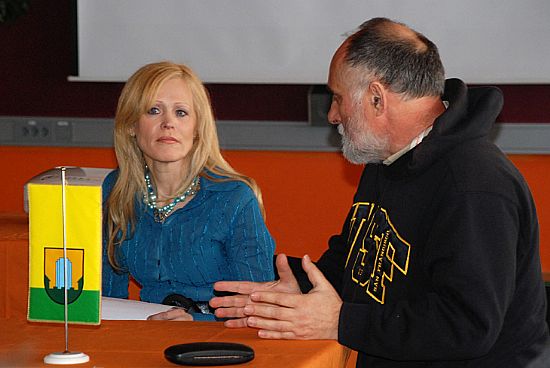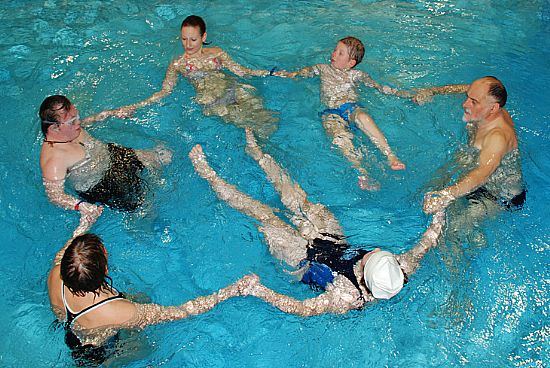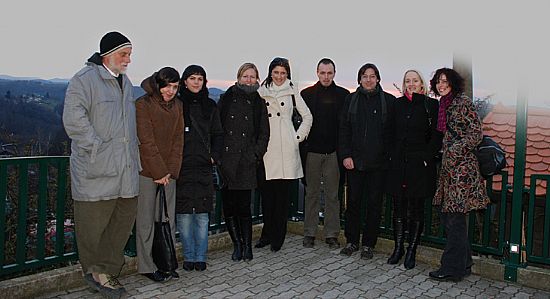e-swimming
Going Nova assisted a European project to encourage disabled swimming. The project was initiated by the Slovenian organisation IPAK, with whom Going Nova has a long-term collaboration.
IPAK, based in the town of Velenje, was set up to encourage innovation, and it's created a wide variety of original and imaginative projects, which have led the way in various fields.
The aim of the project – entitled 'E-Swimming' – was to help swimming therapy reach its full potential across Europe.
'There are a great many people in the European Union who can benefit in this way,' says the project initiator, Dr Stanko Blatnik.

'Across the EU as a whole, about one-sixth of the age group 16-64 have a longstanding health problem or disability. About 2% of all pupils in Europe are educated in special schools or special classes.
'Through the work of dedicated groups, swimming therapy for people with disability or special needs has been shown to provide tremendous benefits. The focus shifts from disability on land to ability in water. But when we look across Europe as a whole, there are many people who are not able to get the opportunity.
'One reason can be a shortage of volunteers. But when people hear about the great benefits of swimming therapy and how they can help, then they are often willing to come forward.
'So the aim of this project is to use modern communication methods, through the internet and elsewhere, to make more people across Europe aware of the benefits of disabled swimming.
'We are going to develop a swimming therapy internet portal with educational and promotional materials, including e-learning courses and workshops. We will use new opportunities such as 3D multi-user virtual environments.'
Dr Blatnik is recognised as a leader in the field of innovation. He has a background in physics and engineering, with a distinguished track record in academia and industry. He has wide experience in online course development, computer process control, and mathematical modelling, and he has a particular interest in the question of how to develop creativity in communities, companies and individuals. He also enjoys swimming, including water basketball and training disabled swimmers, and this interest led to the present project.
The Halliwick method

In 1949 a swimming club in London organised a gala to raise funds for a local school of disabled girls – the Halliwick school. The girls from the school sat in the audience and watched the others swimming. Several of them seemed to be looking longingly at the water and the activity. In the bus on the way back, the club's swimming coach, James McMillan, was quiet. Then after a while, he suddenly said: 'Why not?'
Through the following week the club organisers did a lot of thinking and talking. In James McMillan's words – 'They were children just like ours, so why shouldn't they have a sport and wasn't water an ideal playground?'
So they organised a private session at the local pool which was a big success. One of the club members recalls: 'After a wonderful time (for them) splashing around and a promise (from us) that they could come again next week, we went home tired but happy with Mac saying, "We have now to get working a method of teaching, and a method that will be able to be applied to ALL DISABILITIES." '
James McMillan was studying engineering, so decided to apply some principles of hydrodynamics, and he devised a 10-point method, which involved helping people to feel at home in the water, building up skills such as balance.
That was the beginning of what is now called the 'Halliwick method'.
The partners in the project
 In addition to IPAK and Going Nova, there were three other partners in E-Swimming. Amitié
is an Italian research centre, based in the city of Bologna, specialising in the development of training skills for the information and communication technology sector.
In addition to IPAK and Going Nova, there were three other partners in E-Swimming. Amitié
is an Italian research centre, based in the city of Bologna, specialising in the development of training skills for the information and communication technology sector.
The German partner was the Institute for Innovation In Learning (ILI) of the University of Erlangen-Nurnberg. ILI has much experience in the field of developing network-based learning systems for special targets groups, such as teachers, students, elderly people and disabled people.
Taking part from Spain was Scienter Espana. This is a research centre, based in the city of Granada, which develops new types of training systems.
The film
One of the outputs of the project was a 20-minute film by the Slovenian artist Selena Kuzman, about the joy that disabled people can get from swimming.
Titled I Feel the Water, it is a blend of light and colour, with motion that sometimes looks almost ballet-like in the way that it gives the feeling of shared patterns of movement in the water.
